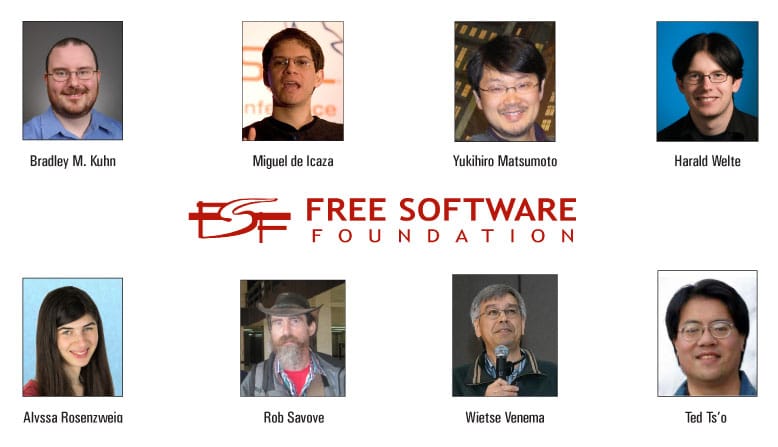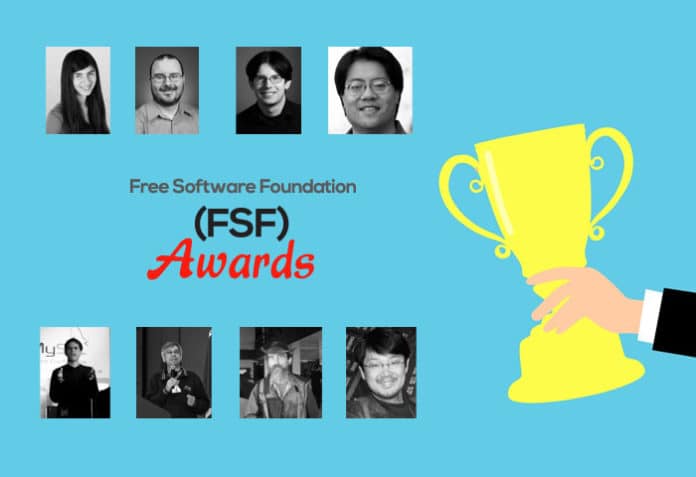The Free Software Awards were instituted in the late nineties, and have been awarded to individuals and companies that are true contributors to free software.
The Free Software Foundation will be presenting its 2021 awards for the advancement of free software at the LibrePlanet conference in March 2022. These awards are given each year.
The Free Software Foundation (FSF) is a non-profit with a worldwide mission to promote computer user freedom. “We defend the rights of all software users,” it says. As a part of its activities, it offers three awards — for the advancement of free software, for a project of social benefit, or for an outstanding new free software contributor.
Earlier awards read like a who’s who of contributors to the free software world. In March 2021, the Award for Advancement of Free Software went to CiviCRM, Bradley Kuhn, and Alyssa Rosenzweig.
CiviCRM allows non-profit organisations to manage their mailings and contact databases. It works for the FSF too. Thus, it was seen by the FSF as “allowing charities and non-profit organisations to do their work without being beholden to a particular proprietary software vendor.”
Canadian hacker Alyssa Rosenzweig leads the Panfrost project to reverse engineer and provide free firmware for the Mali series of GPUs. An Asahi Linux developer, she aims to port GNU/Linux to the Apple M1 processor. Last July, she demonstrated Debian running bare metal on the Apple M1 with a mainline kernel. She also wrote a GNU/Linux client for the Covid-19 contract tracing used in Canada in September 2020.
Kuhn, meanwhile, has worked long to enforce the GNU General Public License (GPL) and to promote copyleft through the Software Freedom Conservancy (which focuses on “ethical technology”).
 Other earlier awardees include:
Other earlier awardees include:
- 2019: Let’s Encrypt, a non-profit certificate authority that hopes to make encrypted Web traffic the default state of the entire Internet; the prolific free software programmer-maintainer-writer Jim Meyering; and Clarissa Lima Borges (a young Brazilian doing usability testing on GNOME applications).
- 2018: OpenStreetMap (the collaborative project to create a free editable map of the world); and Deborah Nicholson, who “advocates access to political information, unfettered freedom of speech and assembly, and civil liberties in our increasingly digital world.”
- 2017: Public Lab (working to democratise science and address environmental issues); and Karen Sandler, the executive director of the Software Freedom Conservancy.
- 2016: SecureDrop (the anonymous whistle-blower platform, originally written by the famed late Aaron Swartz); and the Brazilian hacker Alexandre Oliva. Oliva is the maintainer of linux-libre, the fully free version of the kernel Linux.
- 2015: Library Freedom Project (LFP) and Werner Koch. The LFP is a partnership among librarians, technologists, attorneys, and privacy advocates working for intellectual freedom in libraries. Koch is the founder of GnuPG, the free software cryptographic suite.
- 2015: Sébastien Jodogne (for free software medical imaging and his project Orthanc); and Reglue, which was giving GNU/Linux computers to underprivileged children and their families in Austin, Texas.
- 2014: Matthew Garrett, from the GNOME Foundation’s Outreach Program for Women.
- 2012: Dr Fernando Perez got the award as the creator of IPython, as it provides a rich architecture for interactive computing with an all-in-one debugger, editor, and Python command-line interpreter.
- 2011: Yukihiro ‘Matz’ Matsumoto received the award as the creator of the Ruby programming language.
- 2010: Given to Rob Savoye, a hacker who helped dozens of projects including GCC, GDB, DejaGnu, Newlib, Libgloss, Cygwin, eCos, Expect, multiple major GNU/Linux distributions, and One Laptop Per Child.
- 2009: The award for the Advancement of Free Software was won by John Gilmore, a founder of Cygnus Solutions, which gave free software a place in the business world early on before it gained popularity. The award for Project of Social Benefit was won by the Internet Archive, whose co-founder and chairman is Brewster Kahle.
- 2008: Wietse Venema and Creative Commons. Venema, a Dutch programmer and physicist, is known for writing the Postfix email system, and the TCP Wrapper. The FSF noted: “Since its launch in 2001, Creative Commons has worked to foster a growing body of creative, educational and scientific works that can be shared and built upon by others. Creative Commons has also worked to raise awareness of the harm inflicted by increasingly restrictive copyright regimes.”
- 2007: Harald Welte, the German programmer, founder of Osmocom and involved with netfilter/iptables and Openmoko. He is also a member of the Chaos Computer Club. Osmocom, the open source mobile communication project, implements multiple mobile communication standards — GSM, DECT, TETRA, etc.
- 2006: Ted Ts’o, known for his contributions to the Linux kernel and to file systems (e2fsprogs, ext2, ext3, and ext4).
- 2005: Andrew Tridgell, the Australian programmer, author and contributor to the Samba file server (a free re-implementation of the SMB networking protocol), and co-inventor of the rsync algorithm for transferring and synchronising files.
- 2004: Theo de Raadt, the South African, Canada based founder of OpenBSD and OpenSSH, and a founding member of NetBSD.
Earlier winners of the Free Software Awards include Alan Cox (2003, for advocating software freedom, his outspoken opposition to the US’ DMCA and other technology control measures, and work on the Linux kernel).
Also honoured were individuals whose work impacted technology and knowledge flows at the global level, including Lawrence Lessig (2002, for promoting an understanding of the political dimension of free software, including the idea that “code is law”), Guido van Rossum (2001, for inventing and implementing as free software the Python programming language), and Brian Paul (2000, for his “ground-breaking work on the Mesa 3D Graphics Library”).
Miguel de Icaza (the 27-year-old Mexican) got the award in 1999 for his work on the GNOME project, and a year earlier (1998) Larry Wall received it for Perl, a robust scripting language for sophisticated text manipulation and system management.
What is surprising is that India’s contribution is not visible here.












































































